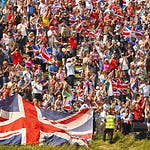British Values.
This is a phrase that I have been hearing for my entire life, from my early days in primary school in the mid noughties through to my work in politics today. If you’re a zoomer like me, you’ll remember seeing things like this and this at school. It’s a concept that is invoked by people on all sides of the political discourse – but what do…
Listen to this episode with a 7-day free trial
Subscribe to Revolution of the Soul to listen to this post and get 7 days of free access to the full post archives.










